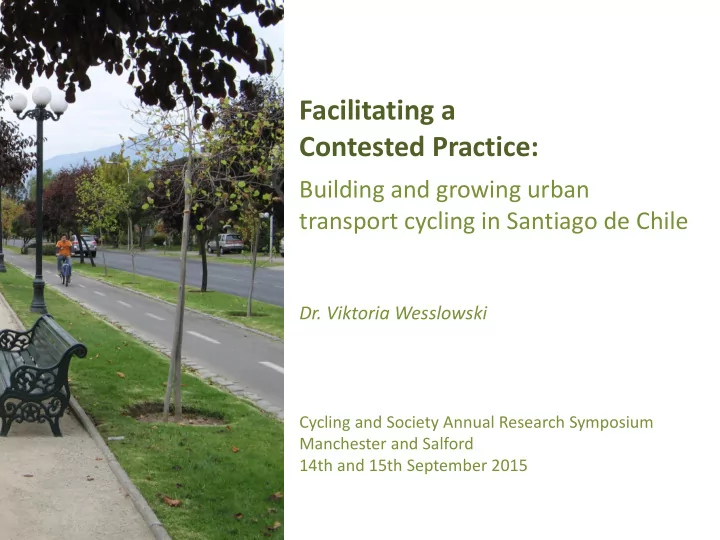

Facilitating a Contested Practice: Building and growing urban transport cycling in Santiago de Chile Dr. Viktoria Wesslowski Cycling and Society Annual Research Symposium Manchester and Salford 14th and 15th September 2015
Contents • Introduction • Methodology • Cycling as Contested Practice • Building practice • Growing practice • Conclusion info@facilitating-sustainable-practices.de 2
Introduction • PhD research at Manchester Architecture Research Centre 2009-2014 • How to facilitate sustainable practices? • How to increase urban transport cycling? • Theoretical basis: – Theories of Practice (as opposed to linear ABC models) – Science and Technology Studies, the Social Construction of Technology (SCOT) approach • Interventions in the trajectory of practices info@facilitating-sustainable-practices.de 3
Research Questions 1. What is transport cycling in Santiago? 2. What kind of interventions can be observed? 3. How are interventions developed, planned and designed? 4. How do these interventions take effect? 5. What can this case study contribute to current debates in practice theory? info@facilitating-sustainable-practices.de 4
Methodology • In-depth case study on the promotion of urban transport cycling in Santiago • Six-month research stay • Methods of data generation: – 43 semi-structured interviews (members of cycling organisations, members of government bodies at municipal, regional and national level, beneficiaries, and other relevant stakeholders) – Participant observation – Photography – Document analysis: laws, policy documents and plans info@facilitating-sustainable-practices.de 5
What is transport cycling in Santiago? CYCLING AS A CONTESTED PRACTICE
Cycling as ‘Contested Practice’ • Competition with driving – Legal – Spatial/infrastructure • Image of urban transport cycling – Stigmatisation now challenged – Environmentally-friendly, healthy, white-collar commuting – Dangerous • Community of practice – Dispersed group of traditional cyclists – Several new and diverse cycling organisations – Dispersed group of new cyclists, not integrated into the community info@facilitating-sustainable-practices.de 7
How are interventions developed, planned and designed? BUILDING PRACTICE
Myths • Cyclists need to be protected from motor traffic • Speed is secondary • Good cycleways are landscaped cycleways • Drivers won’t respect cyclists’ space • Pocuro as prototype of ‘high standard’ design info@facilitating-sustainable-practices.de 9
The Pocuro Cycle Path • First ‘visible’ i.e. constructed cycle path • Segregated/ ‘protected’ • Landscaped, pretty • Slows cyclists down at crossings info@facilitating-sustainable-practices.de 10
Typical Planning Process Technical evaluation SERVIU Municipality GORE Graph adapted from ‘Mapa comunal del Gran Santiago, Chile, con nombres’ by B1mbo, Wikimedia Commons , Public Domain http://commons.wikimedia.org /wiki/File:Comunas_de_Santiag o_%28nombres%29.svg MidePlan Socio-economic evaluation info@facilitating-sustainable-practices.de 11
Building Practice • Interventions to facilitate cycling emerge from the core of the system of automobility. • They open up space for cycling (blue). • The space is still shaped by the dominant practice of driving through planning regulations and design standards. info@facilitating-sustainable-practices.de 12
Building Practice: Conclusion • Providing infrastructure is not a purely technical intervention, but rather a set of political negotiations. • In this case, myths about cycling and evaluation standards for cycleway projects had developed within the system of automobility and ensured the continuity of car-centred planning. info@facilitating-sustainable-practices.de 13
How are interventions developed, planned and designed? GROWING PRACTICE
Targeted Support • Acquiring a bicycle • Adjustments, maintenance and repairs • Learning to ride a bicycle • Cycling in urban traffic info@facilitating-sustainable-practices.de 15
Creating a Community of Practice • Wenger (1998) • Spaces for mutual engagement • Emotional support through the community • Joint enterprise and shared repertoire through education • Growing the community info@facilitating-sustainable-practices.de 16
And you know what, since I ... and on my own, maybe learnt to ride a bike, I would there was a time when I could love it if my sister could learn it have gone on my own, but it's as well. I would love that. […] I like I need the support at my think that one develops the side, I mean, I would like to go wish to be able to teach [this] when they go as a group on to the people whom you love, Sundays, that I'd like. Or, or to any other person as well, obviously, with my daughters. so that they learn, because it It's about feeling the support makes many things easier for of being with another person you. (Interview 23, at one's side. (Interview 21, 11/07/2011) 07/07/2011) info@facilitating-sustainable-practices.de 17
Growing Practice • The interventions emerge from the core of the community and expand the practice (green). • The activities directly target the participation in the practice and are inherently linked to growing and consolidating the community of practice. info@facilitating-sustainable-practices.de 18
Growing Practice: Conclusion • Targeted support for individuals, based on the in-depth understanding of the practice • ‘Side -effect ’: creation of a community of practice • Small-scale, often overlooked in the policy debate • Can be effective in growing the practice in a decentralised organic way info@facilitating-sustainable-practices.de 19
Conclusion • Facilitating urban transport cycling is a complex undertaking, drastically different from the neatness of behavioural models • Building and growing practice are complementary approaches, both to be included in a comprehensive urban transport cycling strategy • Don’t underestimate the work of pro- cycling organisations! info@facilitating-sustainable-practices.de 20
Thank you! Dr. Viktoria Wesslowski E-mail: info@facilitating-sustainable-practices.de
Recommend
More recommend